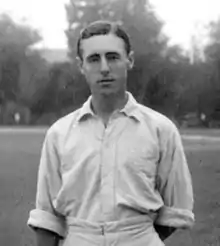 | |||||||||||||||||||||||||||
| Personal information | |||||||||||||||||||||||||||
|---|---|---|---|---|---|---|---|---|---|---|---|---|---|---|---|---|---|---|---|---|---|---|---|---|---|---|---|
| Full name | Donald Macdonald Steele | ||||||||||||||||||||||||||
| Born | 17 August 1892 Adelaide, South Australia | ||||||||||||||||||||||||||
| Died | 13 July 1962 (aged 69) Adelaide | ||||||||||||||||||||||||||
| Batting | Right-handed | ||||||||||||||||||||||||||
| Domestic team information | |||||||||||||||||||||||||||
| Years | Team | ||||||||||||||||||||||||||
| 1911-12 to 1920-21 | South Australia | ||||||||||||||||||||||||||
| Career statistics | |||||||||||||||||||||||||||
| |||||||||||||||||||||||||||
Source: Cricinfo, 24 April 2017 | |||||||||||||||||||||||||||
Donald Macdonald Steele (17 August 1892 – 13 July 1962) was a cricketer who played first-class cricket for South Australia from 1912 to 1921. He was later a prominent doctor in South Australia.
Family and early life
Don Steele was one of six brothers.[1] His elder brothers David Macdonald Steele[2] and Ken Steele[3] were doctors who served as medical officers in the field in World War I. Ken also played first-class cricket for South Australia before the war.[4]
Don attended Prince Alfred College, Adelaide, where he played in the First XI for six years from 1907 to 1912, captaining the team in the last three years.[5] He then studied medicine at the University of Adelaide, qualifying as a doctor at the end of 1919.[6]
Cricket career
Steele played his first game for South Australia in January 1912 while still at school. He became a regular player in the state team in 1912-13 and remained a fixture in the side until the end of the 1920-21 season, studies and professional duties permitting.
In his first match in the 1912-13 season he scored 113 not out in 175 minutes against New South Wales in an innings victory for South Australia.[7] He scored his second century in 1914-15 when he made 100 in 135 minutes, also against New South Wales.[8]
He captained South Australia in the last three matches of the 1920-21 Sheffield Shield season, scoring 107 not out in the first match, against Victoria.[9] He finished the season at the top of the South Australian batting averages, with 280 runs at 56.00.[10]
He was selected to captain the Australian team to tour New Zealand at the end of the season.[11] However, he was unable to go on the tour, having made arrangements to work as a locum in Port Lincoln.[12] His professional duties prevented him from playing any further first-class cricket.
Later life
He practised as a doctor in Port Lincoln for some years[13][1] before returning to practise in Adelaide, where he and his wife lived in Glenelg.[14]
While watching a Test match at Adelaide Oval in 1925 he was called on to treat the English spin bowler Tich Freeman, who had broken his wrist while attempting a catch. Steele put the wrist in splints then took Freeman to hospital.[15]
His son Ian was also a doctor.[14]
References
- 1 2 "Out Among the People". The Advertiser. 8 February 1935. p. 23.
- ↑ "STEELE, David MacDonald MC & Bar". Anzacs Online. Retrieved 1 July 2017.
- ↑ "Kenneth Nugent STEELE". The AIF Project. Retrieved 1 July 2017.
- ↑ "Kenneth Steele". Cricinfo. Retrieved 1 July 2017.
- ↑ "Miscellaneous matches played by Donald Steele". CricketArchive. Retrieved 1 July 2017.
- ↑ "University versus North Adelaide". Chronicle. 6 December 1919. p. 18.
- ↑ "South Australia v New South Wales 1912-13". CricketArchive. Retrieved 1 July 2017.
- ↑ "South Australia v New South Wales 1914-15". CricketArchive. Retrieved 1 July 2017.
- ↑ "Victoria v South Australia 1920-21". CricketArchive. Retrieved 1 July 2017.
- ↑ "Batting and fielding for South Australia, Sheffield Shield 1920-21". CricketArchive. Retrieved 1 July 2017.
- ↑ "Australia v New Zealand. The Commonwealth Team". The Register. 17 January 1921. p. 7.
- ↑ "The New Zealand Trip. Dr Steele Unable to Go". The Journal. 17 January 1921. p. 1.
- ↑ "Dr Don Steele". Sport. 18 October 1926. p. 14.
- 1 2 "About People". The Advertiser. 15 April 1950. p. 12.
- ↑ "Injuries to Englishmen". Sunday Times. 18 January 1925. p. 1.
External links
- Donald Steele at ESPNcricinfo
- Donald Steele at CricketArchive (subscription required)